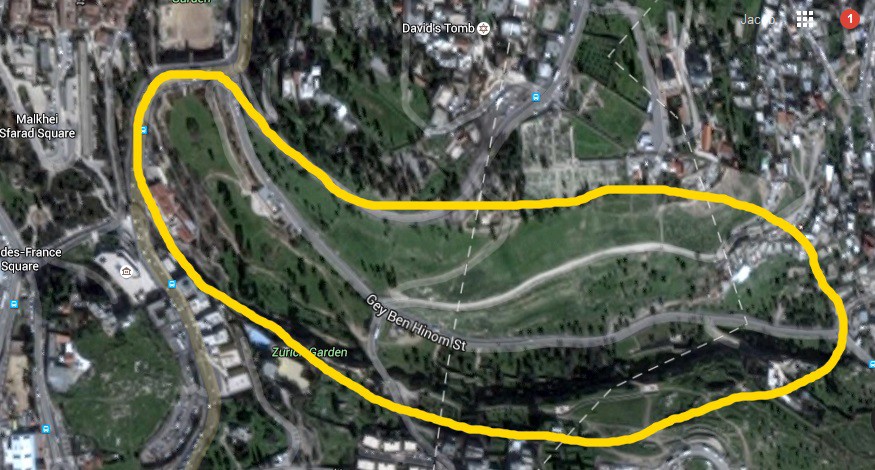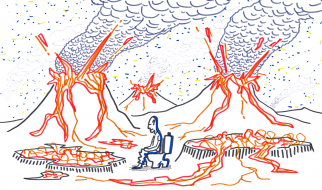
Hell is not a Biblical concept.
Much of the Bible is debatable. Much of the Bible is open to numerous interpretations. There are many theological stances that can be convincingly argued both for AND against.
The modern concept of Hell as a place of eternal conscious torment is not one of them. Today, we are going to look at every mention of ?Hell? in the Bible, and we are going to demonstrate this conceptual staple of Western Christianity to be virtually untenable.
But don?t get me wrong? I believe in Hell.
I?ve read extensively about it. I?ve heard first-hand accounts of it. I?ve even caught glimpses of it myself.
As humans, we seem to be fantastic at creating hell. We sow it into our own lives and the lives of others and then watch as it?s reaped around the world.
Hell is the terror of the refugee. It?s the grief of surviving family members, the despair of the abused spouse, the self-hatred of the neglected child.
But it?s also more than that.
Hell is the disillusioned numbness of the soldier. It?s the hopelessness of the drug addict. It?s the perpetual frustration, anger, and self-loathing of the abusing spouse.
Hell can be found everywhere we look. It can be seen in both the eyes of the oppressed and the eyes of the oppressor. Humanity doesn?t need to be made aware of Hell. We are all too aware of it already.
What we need is good news.
Fortunately, Jesus came to bring just that. He took human form, experienced the joys and hellish torments of our existence, and introduced us to a benevolent Father. He came to show us the way of life ? the path through this hell ? and when he left, he announced the arrival of our personal guide, the Holy Spirit, who would help us navigate this path of life.
For awhile after Christ?s departure, Christians were carriers of life ? evangelists of the Good News. But somewhere along the way, a perverse lie crept into our understanding of God, a lie so horrid, it depicts God as perpetrating evil the Earth?s most depraved minds wouldn?t even consider.
Today, instead of 2 Billion carriers of the Good News, much of Christendom is preoccupied with prophesying a terror of unimaginable proportions.
Hell: a place where people are consciously tormented for all eternity.
Fortunately for humanity, not only does this place not exist, it can?t even be defended in Scripture.
The Word ?Hell? Isn?t Even Found In The Bible
Well? it might be found in your Bible. Let me elaborate.
Most Biblical translations don?t contain the word ?Hell? even a single time.
The King James Bible, which is widely considered to be one of the most inaccurate translations, while also being a fixture in traditionalist Christian circles, contains the most mentions of ?hell? at 54 occurrences. More accurate translations like the NASB and even the highly popular NIV show the word ?hell? occurring between 13?14 times, ALL of which are found in the New Testament.
We?re going to look at each of these occurrences, but before we do, I?d like to put these numbers into perspective. Let?s look at how often more commonly used words are mentioned in the Bible:
- Heaven ? 644 mentions
- Father ? 944 mentions
- Evil ? 657 mentions
- Law ? 599 mentions
- Soul ? 496 mentions
- Death ? 456 mentions
- Judgement ? 344 mentions
- Kingdom ? 384 mentions
- Sin ? 441 mentions
So just to review, we have Judgement mentioned 344 times, Sin mentioned 441 times, and Death mentioned 456 times, and yet we only see Hell mentioned 14 times in accurate translations.
Doesn?t that seem weird?
If hell is such a central part of sin, judgment, and death, wouldn?t it get talked about at least half as often as these associated words? At this rate, Google wouldn?t even know to associate hell with these other words.
Furthermore, IF the common Evangelic view of Hell as a place of eternal, conscious torment is accurate, wouldn?t that warrant significantly more discussion than something like poverty, which is talked about over 2,000 times?
If God is actually planning on PERPETUALLY ROASTING BILLIONS OF PEOPLE, allowing them to permanently agonize for all of eternity? isn?t that a bit more pressing of a discussion than the 1203 words that are addressed more frequently?
Yes, I did the math, and I did it based on the KJV, giving Hell the benefit of the MOST possible occurrences. Even with 4 times the mentions of most translations, there are 1,203 words used more frequently.
Is God just super casual about being the cruelest, most perversely genocidal maniac in history? Or did we get the story wrong.
If you are a good Christian, like I used to be, your first question is going to be a very valid one, ?Doesn?t Jesus speak about Hell?? The simple answer to that question is ?no?, but in order to make that claim, I?m going to have to get my Greek on.
There Are The 4 Words Translated As ?Hell?
Most of the confusion around Hell starts with translation error. There are four separate Hebrew and Greek words which are translated into the single English word ?Hell?, despite having drastically different meanings.
- Sheol (Hebrew)
- Hades (Greek)
- Tartarus (Greek)
- Gehenna (Greek)
The English language is often very limited when trying to express certain concepts. A perfect Biblical example of this is the multiple Greek words translated to the single English word ?Love?. Agape is a special version of love that speaks about God?s love toward humanity. Phileo speaks about brotherly love and Eros refers to sexual love or desire.
And just like ?love?, the English word ?hell? is unilaterally translated from the Greek and Hebrew words Sheol, Hades, Gehenna, and Tartarus, each of which have different meanings.
1. Sheol (H7585)
???? ????? she?o?l she?o?l sheh-ole?, sheh-ole? From H7592; hades or the world of the dead (as if a subterranian retreat), including its accessories and inmates: ? grave, hell, pit.
2. Hades (G86)
??????? hade?s hah?-dace From G1 (as a negative particle) and G1492; properly unseen, that is, ?Hades? or the place (state) of departed souls: ? grave, hell.
3. Gehenna (G1067)
??????? geenna gheh?-en-nah Of Hebrew origin ([H1516] and [H2011]); valley of (the son of) Hinnom; gehenna (or Ge-Hinnom), a valley of Jerusalem
4. Tartarus (G5020)
????????? tartaroo? tar-tar-o?-o From ????????? Tartaros? (the deepest abyss of Hades); to incarcerate in eternal torment: ? cast down to hell.
Below, I?ve listed the full 13 times ?Hell? is used in the NASB translation of the Bible. Sheol and Hades are always correctly translated as ?the grave? in the NASB and other more accurate translations, which is why you don?t see any references below. I?ve included those words in our discussion simply because they will come up incorrectly as ?Hell? in the KJV.
You?ll notice that NONE of the above 4 words actually translate to Hell. The closest is Hades, which is derived from Greek mythology and is never actually translated to ?Hell? in academically accepted translations. Sheol and Hades are both always translated as ?death? or ?the grave? in the NASB and other more accurate translations. And as we are about to see, neither Tartarus nor Gehenna can be correctly translated as ?Hell? either.
In other words, ?Hell? is NOT actually in the Bible.
But a claim like this warrants a worthy defense, and that?s why we are going to look at EVERY single time the word ?Hell? is used in the Bible.
Using the NASB, we see 13 references:
- Matthew 5:22 ? Gehenna
- Matthew 5:29 ? Gehenna
- Matthew 5:30 ? Gehenna
- Matthew 10:28 ? Gehenna
- Matthew 18:9 ? Gehenna
- Matthew 23:15 ? Gehenna
- Matthew 23:33 ? Gehenna
- Mark 9:43 ? Gehenna
- Mark 9:45 ? Gehenna
- Mark 9:47 ? Gehenna
- Luke 12:5 ? Gehenna
- James 3:6 ? Gehenna
- 2 Peter 2:4 ? Tartarus
You will notice then that the full conversation of ?Hell? comes down to 12 Gehenna mentions and 1 mention of Tartarus.
Tartarus is not a normal Greek word. Like Hades, it?s the name of a place/person in Greek mythology, appearing in writing 700 years before Christ as part of the Greek poet Hesiod?s Theogony. It denotes a dark place below even Hades, and accordingly, is the only one of our 4 words to have ?eternal? torment inherently linked to it.
Even if you want to use Greek mythology to defend your views of God, 2 Peter 2:4 isn?t talking about people. It?s talking about where God sent fallen angels.
So if you?re keeping track, this leaves us with only ONE single word on which to base our Biblical analysis of the word ?Hell?.
Gehenna.
Gehenna ? Literal Place of Perpetual Burning
Gehenna accounts for 12 of the 13 Hell mentions, and most importantly, it comprises 100% of Jesus? alleged references to ?Hell?.
So what is Gehenna?
Its a valley. A literal valley. A physical, geographic location. The Valley of Hinom. In fact, here?s what this valley (and apparently Hell) looks like today.

There it is. And look, passing right through the middle of it is Gey Ben Hinom St.
The typical response here is that Jesus was using the valley of Hinom figuratively to mean our modern concept of Hell. But figurative to who?
It really doesn?t matter what this valley means to us today. Jesus wasn?t speaking to us. He was speaking to Jews who lived 2,000 years ago.
So the real question is, what did Gehenna mean to the Jews of Jesus? day?
The section of this valley referred to as ?Gehenna? was well known throughout Israel as an evil and dark place, used for a variety of evil acts throughout Israel?s history. In the time of Hosea, the rebellious Israelites committed child sacrifice there to honor the pagan god Molech (Molek), as seen in 2 Chron 28:3.
Moreover, he burned incense in the valley of Ben-hinnom and burned his sons in fire, according to the abominations of the nations whom the LORD had driven out before the sons of Israel.
Later, in 2 Kings 23:10, it says that King Josiah ?desecrated Topheth, which was in the Valley of Hinnom, so no one could use it to sacrifice their son or daughter in the fire to Molek.?
This valley was known as a place of fiery torture and sacrifices to honor pagan gods. When King Josiah burned down the evil altars, the location remained a site for burning pagan artifacts as the country was purged of idolatry. As time went on and there were no more idols to burn, people began dumping and burning their trash in the valley, a practice that continued all the way through the time of Jesus.
In fact, when Jesus spoke of ?Gehenna?, it was literally a place of continuous fire as Jerusalem?s defacto trash dump, in which fires would constantly burn away whatever was not wanted inside of the city. Any type of filth, including human cadavers were thrown into this dump to burn away.
Isaiah 66 speaks of this saying ?And they will go out and look on the dead bodies of those who rebelled against me; the worms that eat them will not die, the fire that burns them will not be quenched, and they will be loathsome to all mankind.?
When we look at history, we see that the Gehenna was quite literally a place of perpetual fire. We see a dump filled with so many bodies that the worms would never die from lack of sustenance. The valley contained so much trash that the bodies would burn perpetually without end.
Sin Invites Hell Into Your Life
Now that we know the historical background of Gehenna, let?s look at what Jesus says about this place.
Matthew 5:30 ?And if your right hand causes you to stumble, cut it off and throw it away. It is better for you to lose one part of your body than for your whole body to go into hell (Gehenna).?
Remember that dead bodies were literally thrown into this dump, so Jesus is making a parallel by saying ?thrown into Gehenna?(the dump).
In traditional Hebrew thought, Earthly physical bodies were left on Earth while spirits were preserved, so it wouldn?t have made sense for Jesus to speak about a physical body being cast into a spiritual hell. Instead, Jesus is using a well-known landmark to illustrate how significant and pervasive the destruction of sin is.
Jesus is literally saying that cutting off your hand will be less damaging to your life than a lifestyle of sin.
Jewish thought views sin as self-inflicted judgment. In other words, when you sin, you inflict judgment upon yourself. This belief is so sincere, that even today, many orthodox Jews believe the Holocaust was their own fault ? that it was their deserved judgment for the sins of Israel and the failure of the Jews to bring the world into the knowledge of Yahweh.
As extreme as that sounds, it gives us insight into the perspective of the Jews that were hearing Jesus? words. It?s better to lose your eye than to let your eye result in your total self-destruction via sin.
In other words, sin isn?t meaningless; it?s literally inviting Hell into your life.
Jesus is using the most disgusting location in Jerusalem to illustrate how destructive sin is and to encourage his audience to overcome it NOW, so they could freely enjoy abundant life instead of falling into self-destructive patterns.
This same concept presents itself in the only non-Gospel use of Gehenna, found in James 3:6,
The tongue also is a fire, a world of evil among the parts of the body. It corrupts the whole body, sets the whole course of one?s life on fire, and is itself set on fire by hell (Gehenna).
Evil from one body part corrupts the whole body. Sound familiar?
Jesus? same teaching on cutting off body parts accounts for 6 of our 12 Gospel mentions of Gehenna due to the story being repeated several times in the Gospels. The James reference gives us a 7th, but speaking of sin isn?t the only way Jesus used Gehenna to make a point.
Children Of Destruction
In Matthew 23:15 we see Jesus refer to the Pharisees as ?Children of Gehenna? and later in verse 33, queries, ?how will you escape being condemned to Gehenna??
This is telling on multiple levels and serves to handily solidify the argument for Jesus referencing literal Gehenna as a meaningful symbol.
For one, the Pharisees were all about perceived righteousness. They obsessively followed every directive of the Law and made a continuous presentation of their cleanliness and piousness.
And here comes Jesus calling them children of the trash heap ? telling them that for all their pomp and circumstance, their own ?righteousness? won?t be enough to save them from burning in the trash pit like the bodies of the poor.
To add a second level of insult, remember that in John 8, the Pharisees responded to Jesus? teaching by boasting that they were sons of Abraham. They took pride in their lineage, and here is Jesus calling them children of the burning trash pile.
lol BURNED!
That?s our 8th and 9th Gehenna references.
But Let?s Assume I?m Wrong
Let?s just assume, for the sake of argument, that Jesus is using Gehenna as a reference to death and the afterlife. While each of the references to Gehenna can be easily interpreted via our new historical lens, there are a few verses where an argument can conceivably be made otherwise.
The best example is seen in Matthew 10:28 and Luke 12:5, (our 10th and 11th Gehenna references) where Jesus says:
?Do not fear those who kill the body but are unable to kill the soul; but rather fear Him who is able to destroy both soul and body in Gehenna.?
Let?s assume here that Jesus is using Gehenna to mean Hell. In this case, we don?t see a picture of eternal torment. Jesus is saying to His audience that they should be more concerned about a God who CAN permanently destroy their body and soul.
Let?s look at that word ?destroy?.
Destroy (G622)
?????????? apollumi ap-ol?-loo-mee From G575 and the base of G3639; to destroy fully (reflexively to perish, or lose), literally or figuratively: ? destroy, die, lose, mar, perish.
That?s a word of finality. It?s not a word of perpetual torment. The entire idea of perpetual fire comes from the imagery of Gehenna. Even if we interpret Jesus to be figuratively referencing Hell, where?s the eternal suffering of unbelieving humans? Where is that narrative?
Furthermore, if we take this back to Hebrew thought, we see that the Jews believed all good and evil to come from God. Through this lens, it?s far more probable that Jesus is yet again discussing the destruction of sin in Matt 10:28? certainly more probable than believing ?I CAN destroy you? means ?I?m planning to torture you forever?.
Conclusion
At this point, we?re left with just one reference from which to derive a doctrine of eternal torture. Matthew 5:22 says,
But I say to you that everyone who is angry with his brother shall be guilty before the court; and whoever says to his brother, ?You good-for-nothing,? shall be guilty before the supreme court; and whoever says, ?You fool,? shall be guilty enough to go into the fiery Gehenna.
Yet again, this passage seems to corroborate the idea of a literal Gehenna without suggesting eternal torture. There?s nothing unusual to this other than Jesus raising the standard of what constitutes a punishable offense. Whoever heard of going to court for being angry?
If anything, this points back to our original discussion of Gehenna. Jesus is demonstrating how little it takes for sin to work it?s destruction. Just a bit of unresolved anger, then a deepening of the relational divide, then you are at the point of actually despising your brother and the destruction is already upon you.
Is that a little bit of a stretch? Perhaps.
But certainly not as much of a stretch as looking at these 13 passages and somehow coming away with a God who tortures people mercilessly for all eternity.
???How???
This narrative is not only poor exegesis and bad theology, it also replaces the face of a loving Father (bringing good news) with the nightmarish mask of a merciless tormentor.
If the Bible explicitly supported this idea, we?d be forced to make a more difficult choice. But it doesn?t. Not in the slightest.
For all intents and purposes, the word ?Hell? isn?t even in the Bible.
But we aren?t quite done. Next week, we?ll be looking at several passages of scripture that suggest a Hell-like narrative without actually using the word ?Hell?. Stuff like the lake of fire, the parable of the sheep and the goats, and the parable of Lazarus and the rich man. We?ll use this to round out our discussion of Hell?s absence from the Bible and then examine where the modern concept of Hell actually originated.
Co-written by Jacob McMillen & Josiah Pemberton via Brazen Church


